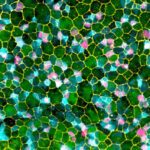Link to Pubmed [PMID] – 16470869
J. Neurobiol. 2006 Apr;66(5):463-75
Addiction is a complex maladaptive behavior involving alterations in several neurotransmitter networks. In mammals, psychostimulants trigger elevated extracellular levels of dopamine, which can be modulated by central cholinergic transmission. Which elements of the cholinergic system might be targeted for drug addiction therapies remains unknown. The rewarding properties of drugs of abuse are central for the development of addictive behavior and are most commonly measured by means of the conditioned place preference (CPP) paradigm. We demonstrate here that adult zebrafish show robust CPP induced by the psychostimulant D-amphetamine. We further show that this behavior is dramatically reduced upon genetic impairment of acetylcholinesterase (AChE) function in ache/+ mutants, without involvement of concomitant defects in exploratory activity, learning, and visual performance. Our observations demonstrate that the cholinergic system modulates drug-induced reward in zebrafish, and identify genetically AChE as a promising target for systemic therapies against addiction to psychostimulants. More generally, they validate the zebrafish model to study the effect of developmental mutations on the molecular neurobiology of addiction in vertebrates.

